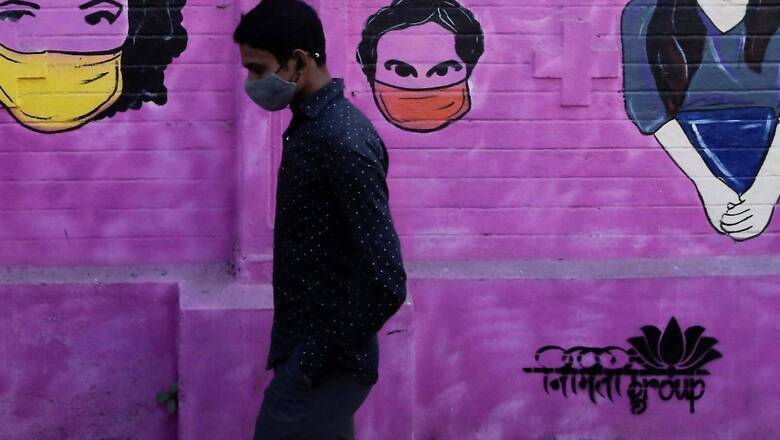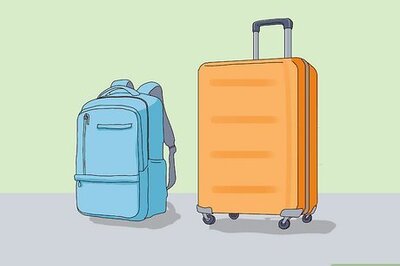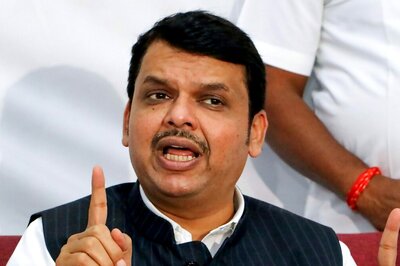
views
Two years since the onset of the Covid-19 pandemic, India has witnessed a humongous spread of the coronavirus with almost a thousand cases being reported each day. However, the majority of the cases found positive were either asymptomatic or those displaying mild symptoms. These cases are usually less lethal and one can recover at the comfort of their homes under medical guidance and minimal intervention.
In a bid to cater to those patients displaying mild Covid-19 symptoms or are asymptomatic, the Ministry of Health has formulated a slew of guidelines for home isolation from time to time in order to guide the patients with regards to the precautions that need to be followed by them and their family members, signs that require monitoring and prompt reporting to health facilities.
However, it should be noted that the present guidelines are applicable to patients who have been clinically assessed and assigned as mild/asymptomatic cases of Covid-19.
What are Asymptomatic/Mild Cases of Covid?
The asymptomatic cases are confirmed cases of coronavirus who are not experiencing any symptoms and have an oxygen saturation of more than 93 per cent. While mild cases are patients with upper respiratory tract symptoms with or without fever, without shortness of breath, and having oxygen saturation of more than 93 per cent.
Who Are Eligible for Home Isolation?
Patients who are clinically assigned as mild/asymptomatic cases by the treating Medical Officer are eligible for home isolation. In addition, such cases should have the requisite facility at their residence for self-isolation and for quarantining the family contacts.
Elderly patients aged more than 60 years and those with co-morbid conditions such as hypertension, diabetes, heart disease, chronic lung/liver/kidney disease, cerebro-vascular disease can also stand eligible for home isolation but only after proper evaluation by the treating medical officer.
Meanwhile, patients suffering from immune-compromised status (HIV, transplant recipients, cancer therapy, etc.) are not recommended for home isolation and shall only be allowed home isolation after proper evaluation by the treating Medical Officer.
Code of Conduct for Covid-19 Patient
- The patient must isolate himself from other household members, stay in the identified room, and be away from other people at home, especially the elderly and those with co-morbid conditions like hypertension, cardiovascular disease, renal disease, etc.
- The patient should stay in a well-ventilated room with cross ventilation and windows should be kept open to allow fresh air to come in.
- Patient should at all times use a triple-layer medical masks. They should discard the mask after 8 hours of useor earlier if the mask becomes wet or is visibly soiled. In the event of the Caregiver entering the room, both Caregiver and the patient may preferably consider using an N-95 mask.
- Mask should be discarded after cutting them to pieces and putting in a paper bag for a minimum of 72 hours
- The patient must take rest and drink a lot of fluids to maintain adequate hydration.
- Undertake frequent hand washing with soap and water for at least 40 seconds or clean with an alcohol-based sanitizer.
- The patients shall not share personal items including utensils with other people in the household.
- Need to ensure cleaning of frequently touched surfaces in the room (tabletops, doorknobs, handles, etc.) with soap/detergent & water. The cleaning can be undertaken either by the patient or the caregiver duly following required precautions such as the use of masks and gloves.
- Self-monitoring of blood oxygen saturation with a pulse oximeter for the patient is advised.
- The patient shall self-monitor his/her health with daily temperature monitoring and report promptly if any deterioration of symptom is noticed. The status shall be shared with the treating Medical Officer as well as surveillance teams/Control room.
- In the case of a caregiver (ideally someone who has completed his Covid-19 vaccination schedule who is available to provide care on 24×7 basis) they are required to wear a triple layer medical mask at all times when around the patient.
Exposure to Patient/Patient’s Environment?
- Avoid direct contact with body fluids (respiratory, oral secretions including saliva) of the patient. Use disposable gloves while handling the patient.
- Avoid exposure to potentially contaminated items in his immediate environment (e.g. avoid sharing eating utensils, dishes, drinks, used towels or bed linen).
- Food must be provided to the patient in his room. Utensils and dishes used by the patient should be cleaned with soap/detergent and water while wearing gloves. The utensils may be re-used after proper cleaning.
- Clean hands after taking off gloves or handling used items. Use triple layer medical mask and disposable gloves while cleaning or handling surfaces, clothing or linen used by the patient.
- The used masks, gloves and tissues or swabs contaminated with blood/body fluids of COVID-19 patients, including used syringes, medicines, etc., should be treated as biomedical waste and disposed of accordingly by collecting the same in a yellow bag and handed over to waste collector separately so as to prevent further spread of infection within household and the community.
How to Treat a Mild/Asymptomatic Patient in Home Isolation?
- Patients must be in communication with a treating Medical Officer and promptly report in case of any deterioration.
- The patient must continue the medications for other co-morbidities/ illness after consulting the treating Medical Officer.
- Patient may utilize the tele-consultation platform made available by the district/state administration including the e-Sanjeevani tele-consultation platform available at https://esanjeevaniopd.in/.
- Patients may perform warm water gargles or take steam inhalation thrice a day
- If fever is not controlled with a maximum dose of Tab. Paracetamol 650 mg four times a day, consult the treating doctor
- Do not rush for self-medication, blood investigation or radiological imaging like chest X ray or chest CT scan without consultation of your treating Medical Officer.
- Steroids are not indicated in mild disease and shall not be self-administered. Overuse & inappropriate use of steroids may lead to additional complications.
- Treatment for every patient needs to be monitored individually as per the specific condition of the patient concerned and hence generic sharing of prescriptions shall be avoided
- In case of falling oxygen saturation or shortness of breath, the person may require hospital admission and shall seek immediate consultation of their treating Medical Officer/surveillance team/Control room.
When to Seek Medical Attention?
Unresolved High-grade fever (more than 100° F for more than 3 days).
Difficulty in breathing.
Dip in oxygen saturation (SpO2 ≤ 93% on room air at least 3 readings within 1 hour) or respiratory rate > 24/min.
Persistent pain/pressure in the chest.
Mental confusion or inability to arouse.
Severe fatigue and myalgia.
Responsibilities of Grass-Root Level Surveillance Teams
- The Surveillance Teams (ANM, Sanitary inspector, MPHW etc) shall be responsible for initial assessment of the patient and whether the requisite facilities are there for home isolation.
- The health worker should contact the patient daily preferably in-person or over telephone/mobile and obtain the details of temperature, pulse, oxygen saturation, patients overall wellness and worsening of signs/ symptoms.
- The surveillance team may provide home isolation kits to the patient/caregiver as per the policy of the State Government. The Kit may contain masks, hand sanitizers, paracetamol along with a detailed leaflet to educate patients and family members in local language.
- If there is reported worsening of signs/ symptoms and/or fall in oxygen saturation, the Surveillance team shall re-assess the patient and inform the Control Room for shifting the patient to hospital.
- The Surveillance Team shall also undertake the patient education on the disease, its symptoms, warning signs, Covid-appropriate behaviour and need for vaccination for all eligible members.
When to Discontinue Home Isolation?
As per the guidelines, patients under home isolation will stand discharged and end isolation after at least 7 days have passed from testing positive and no fever for 3 successive days and they shall continue wearing masks. There is no need for re-testing after the home isolation period is over. Asymptomatic contacts of infected individuals need not undergo Covid test & monitor health in home quarantine.
Read all the Latest India News here



















Comments
0 comment